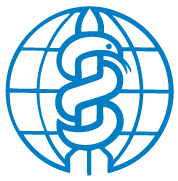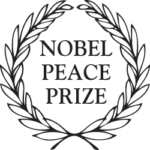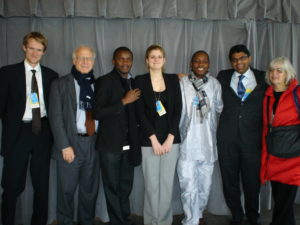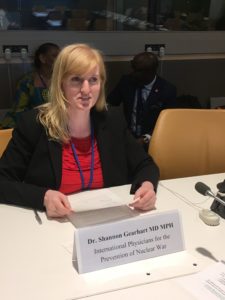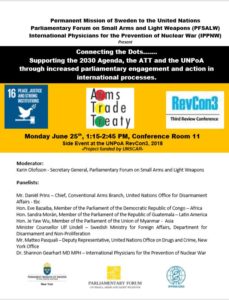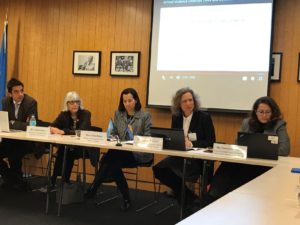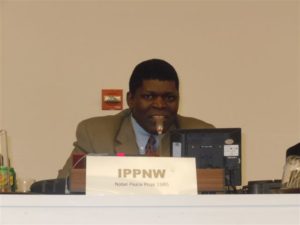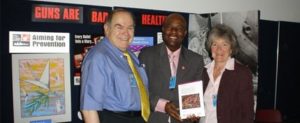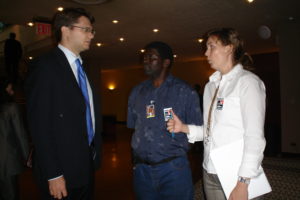United Nations Meetings on Disarmament
IPPNW staff and members from around the world regularly participate in key disarmament-related United Nations (UN) events in New York, Vienna, and Geneva to advocate for public health approaches to armed violence prevention.
We took a prominent role in the UN Conference on the Illicit Trade in Small Arms and Light Weapons in All Its Aspects convened in 2001. The result of the conference was a “Programme of Action to Prevent, Combat and Eradicate the Illicit Trade in Small Arms and Light Weapons in All Its Aspects” or UN PoA. Since then IPPNW has actively participated in subsequent meetings relating to the PoA, bringing a public health message to these proceedings.
We also served on the Steering Board of the Control Arms Coalition that helped pass the historic international Arms Trade Treaty (ATT), which entered into force in December 2014.
Brief summaries of some of our active engagement at UN disarmament events include the following:
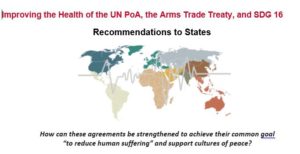 Dr. Shannon Gearhart spoke on a panel IPPNW organized with the Parliamentary Forum on Small Arms and Light Weapons on “Connecting the Dots: Supporting the 2030 Agenda, the ATT and the UN PoA through increased parliamentary engagement and action in international processes.” She spoke of her personal experiences treating victims of gun violence as well as the importance of applying a public health lens to arms control policy measures. She distributed IPPNW’s Recommendations to States on the PoA.
Dr. Shannon Gearhart spoke on a panel IPPNW organized with the Parliamentary Forum on Small Arms and Light Weapons on “Connecting the Dots: Supporting the 2030 Agenda, the ATT and the UN PoA through increased parliamentary engagement and action in international processes.” She spoke of her personal experiences treating victims of gun violence as well as the importance of applying a public health lens to arms control policy measures. She distributed IPPNW’s Recommendations to States on the PoA.
-
UN Programme of Action on Small Arms and Light Weapons RevCon3 PrepCom, NYC, USA – March 19-23, 2018
![]() IPPNW partnered with the Parliamentary Forum on Small Arms and Light Weapons to conduct a side event the UN PoA PrepCom in NYC. The panel was hosted by the Swedish Mission. IPPNW’s Dr. Cathey Falvo joined panelists including the Hon. Clara Rojas, member of Parliament, Colombia and Ms. Simonetta Grassi, head of the Global Firearms Programme, UN Office on Drugs and Crime to discuss synergies between the UN PoA, the ATT and Agenda 2030. Dr. Falvo addressed their common goal of “reducing human suffering” and how health professionals and parliamentarians can work together to achieve that goal. Dr. Falvo was also one of a small panel of NGO speakers to address States delegates at the main session, where she described public health approaches to armed violence prevention. We participated in a small NGO meeting with RevCon3 President Jean-Claude Brunet of France where we discussed with him how the PoA could help implement “action-oriented research” in States.
IPPNW partnered with the Parliamentary Forum on Small Arms and Light Weapons to conduct a side event the UN PoA PrepCom in NYC. The panel was hosted by the Swedish Mission. IPPNW’s Dr. Cathey Falvo joined panelists including the Hon. Clara Rojas, member of Parliament, Colombia and Ms. Simonetta Grassi, head of the Global Firearms Programme, UN Office on Drugs and Crime to discuss synergies between the UN PoA, the ATT and Agenda 2030. Dr. Falvo addressed their common goal of “reducing human suffering” and how health professionals and parliamentarians can work together to achieve that goal. Dr. Falvo was also one of a small panel of NGO speakers to address States delegates at the main session, where she described public health approaches to armed violence prevention. We participated in a small NGO meeting with RevCon3 President Jean-Claude Brunet of France where we discussed with him how the PoA could help implement “action-oriented research” in States.
-
6th Biennial Meeting of States on the Implementation of the Programme of Action on Small Arms and Light Weapons New York, USA – June 6-10, 2016
IPPNW doctors once again brought a health message to the UN with the theme connecting the dots between health, human security and sustainable development at the Sixth Biennial Meeting of States on the Programme of Action on Small Arms. IPPNW co-organized a panel featuring doctors and parliamentarians that was hosted by the Swedish Mission to the UN and co-convened with the Stockholm-based Parliamentary Forum on Small Arms and Light Weapons. The starting point for the conversations was how health professionals and parliamentarians can work together to reduce armed violence and advance the PoA and the SDGs, specifically SDG 16 on reducing all forms of violence.
-
First Conference of States Parties to the Arms Trade Treaty, Cancun, Mexico – August 24-27, 2015
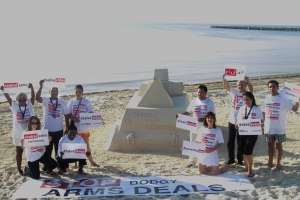 IPPNW-Zambia leader Dr. Bob Mtonga and colleagues from the Control Arms Coalition took to the sands of Cancun, Mexico to protest the proliferation of the global arms trade. Control Arms had been advocating messages of transparency and the importance of robust, life-saving implementation of the Treaty. This was highlighted through a media action on the beach that unveiled a tank sculpted from sand accompanied by the message to save lives and stop dodgy arms deals.
IPPNW-Zambia leader Dr. Bob Mtonga and colleagues from the Control Arms Coalition took to the sands of Cancun, Mexico to protest the proliferation of the global arms trade. Control Arms had been advocating messages of transparency and the importance of robust, life-saving implementation of the Treaty. This was highlighted through a media action on the beach that unveiled a tank sculpted from sand accompanied by the message to save lives and stop dodgy arms deals.
-
UN Pro
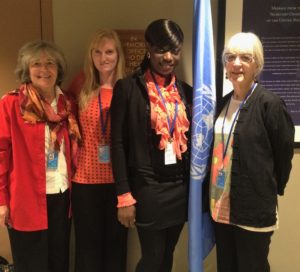 gramme of Action on Small Arms and Light Weapons Second Meeting of Governmental Experts (MGE2) New York, USA – June 1-5, 2015
gramme of Action on Small Arms and Light Weapons Second Meeting of Governmental Experts (MGE2) New York, USA – June 1-5, 2015
IPPNW doctors played a key role in integrating public health information into the dialogue of the United Nations Programme of Action on Small Arms Second Meeting of Governmental Experts, participating in a side panel on New Technologies and Human Security, speaking at the NGO presentation to delegates, and distributing recommendations to States on the PoA and health.
-
5th Biennial Meeting of States on the Implementation of the Programme of Action on Small Arms and Light Weapons New York, USA – June 16-20, 2014
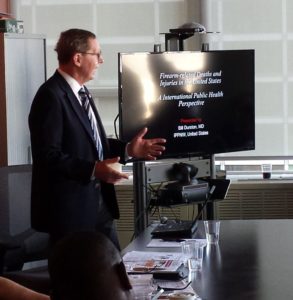 IPPNW fielded an active delegation of ten people: from the U.S., Dr. Bill Durston and his wife Diane from California, Dr. Shannon Gearhart from New York PSR, Dr. Don Mellman and Kay Tyler from Florida, and Maria Valenti from the Central Office; from Nigeria, Drs. Ogebe Onazi and Emeka Okolo; from Zambia, Dr. Bob Mtonga; and from India, Dr. Balkrishna Kurvey. We met with delegations from the U.S., Nigeria, Zambia, India and others to share our expertise with policy makers.
IPPNW fielded an active delegation of ten people: from the U.S., Dr. Bill Durston and his wife Diane from California, Dr. Shannon Gearhart from New York PSR, Dr. Don Mellman and Kay Tyler from Florida, and Maria Valenti from the Central Office; from Nigeria, Drs. Ogebe Onazi and Emeka Okolo; from Zambia, Dr. Bob Mtonga; and from India, Dr. Balkrishna Kurvey. We met with delegations from the U.S., Nigeria, Zambia, India and others to share our expertise with policy makers.
“On an average day in the United States 86 people are killed by guns,” was one of many alarming facts presented by Dr. Durston, a passionate IPPNW speaker at a side panel conducted by IPPNW, the Parliamentary Forum on Small Arms and Light Weapons and IANSA. that focused on how guns affect health and development around the world at the U.N. Fifth Biennial Meeting of States to Consider Implementation of the Programme of Action (PoA) on Small Arms and Light Weapons.
Improving the Health of the PoA featured Dr. Durston as well as Dr. Okolo, and parliamentarians Daisy Tourné, Uruguay, and Christer Winbäck, Sweden, who both emphasized the importance of health professionals working with policy makers to stem the tide o firearm violence. Dr. Okolo described his research on small arms injuries in Nigeria, and how armed violence is hampering the delivery of health care in his country and enabling terrorists. Two other IPPNW speakers recounted their stories as gun violence victims – Dr. David Onazi from Nigeria, and a high school participant from IPPNW who was caught in a crossfire of bullets on his way to the store when he was seven.
IPPNW distributed our white paper How Healthy is the PoA? Doctors take the pulse of progress, which include snapshots of the U.S., Mexico, Nigeria and Austria regarding levels of violence and gun violence, as well as observations on worldwide deaths and injuries from armed violence since the PoA was implemented in 2001.
-
Final Diplomatic Conference on the Arms Trade Treaty New York, USA March 18-28, 2013
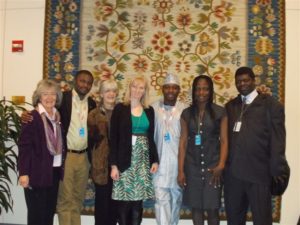 IPPNW engaged in a wide variety of efforts to support passage of a strong and effective Arms Trade Treaty leading up to the Diplomatic Conference held March 18-28 at the United Nations in New York. These included working with colleagues from the Control Arms Coalition including Pax Christi, Oxfam, and Amnesty International on organizing a letter from 18 Nobel Peace Prize Laureates including former president Jimmy Carter and Desmond Tutu to President Barack Obama urging him to support a humanitarian-based ATT.
IPPNW engaged in a wide variety of efforts to support passage of a strong and effective Arms Trade Treaty leading up to the Diplomatic Conference held March 18-28 at the United Nations in New York. These included working with colleagues from the Control Arms Coalition including Pax Christi, Oxfam, and Amnesty International on organizing a letter from 18 Nobel Peace Prize Laureates including former president Jimmy Carter and Desmond Tutu to President Barack Obama urging him to support a humanitarian-based ATT.
PSR Executive Director Dr. Catherine Thomasson was part of a delegation that delivered the letter to senior White House National Security staff just prior to the UN meeting. “IPPNW participated in the historic 1997 meeting in New York of a small group of Nobel Peace Prize Laureates, convened by Oscar Arias, who called for an International Code of Conduct on arms trade that would benefit all of humanity,” said Dr. Thomasson at the handover meeting. “After 15 long years and millions killed, maimed or traumatized by gun violence, we are hopeful that this month the world’s countries will make history and finally enact a humanitarian-based Arms Trade Treaty.”
We also worked with U.S. Physicians for Social Responsibility to organize nearly two thousand letters to the President and elected representatives.
As the only health member on the Steering Board of the Control Arms NGO coalition, our active participation in meetings with delegates from countries around the world ensured they understood the dire health consequences that result from the unregulated spread of armaments worldwide.
IPPNW delegates participating included Drs. David Onazi, Omolade Oladejo, and Emeka Okolo from Nigeria, Drs. Shannon Gearhart, Cathey Falvo, Donald Mellman, and Andrew from the US, Kay Tyler from the US, Dr. Bob Mtonga from Zambia, Vera Gruner from Austria, and Central Office Aiming for Prevention Director Maria Valenti.
-
UN Conference on the Arms Trade Treaty New York, USA – July 2012
IPPNW leaders played a key role in bringing a critical health voice to the month-long July 2012 negotiations for an Arms Trade Treaty at the UN. As the only health member on the Steering Board of the Control Arms NGO coalition, our active participation in meetings with delegates from countries around the world ensured they understood the dire health consequences that result from the unregulated spread of armaments worldwide.
IPPNW doctors and staff who participated in the negotiations experienced a roller coaster of emotions, from optimism at the outset that a strong and humanitarian treaty was within the world’s grasp, to huge disappointment on the last day of the conference when a number of countries including the United States blocked an agreement and asked for more time to work on the text.
Efforts began to bring the treaty text to the UN General Assembly in the fall fall.
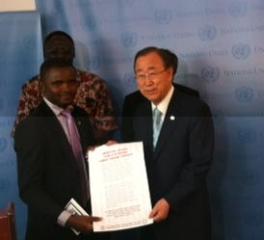 IPPNW’s Activities at the ATT Diplomatic Conference, UN, New York City
IPPNW’s Activities at the ATT Diplomatic Conference, UN, New York City
IPPNW had a strong presence at the opening week of the conference. IPPNW Nigeria’s Ogebe Onazi, MD, presented UN Secretary General Ban Ki-moon with IPPNW’s “Medical Alert for a Strong ATT” with over 1700 physicians, nurses, and other medical professionals’ signatures as part of a high level ceremony. “It is my honor as a young physician from the once peaceful state of Jos, Nigeria to join the voice of health workers in this civil society appeal for UN Member States to conclude an effective, humanitarian-focused ATT,” said Dr. Onazi. “We are here to appeal to the common humanity of our leaders to take a bold step forward to bringing an end to the unregulated international weapons trade.”
“We must act together. The world is over-armed and peace is underfunded,” said the Secretary General in his remarks following the presentations
Later that week, IPPNW’s conducted a side event sponsored by the Permanent Mission of Nigeria to the United Nations, A Framework on Global Health and the ATT. Dr. Onazi moderated the panel and introduced Mr. Richards Adejola, Minister, Permanent Mission of the Republic of Nigeria, who spoke on the important relationship of the ATT and health. Cathey Falvo, MD MPH (IPPNW/US and president of International Society of Doctors for the Environment) spoke on A Framework on Global Health and the ATT. Diego Zavala, PhD, Ponce School of Medicine and Health Sciences, Puerto Rico, spoke on The Latin American Perspective on Health Costs of Armed Violence. Adebayo Owoeye, MD (IPPNW/Nigeria and Nigerian Doctors for the Welfare of Mankind) told of his research that led to Health Lessons form Terrorist Attacks in Nigeria. Andrew Kanter, MD MPH (President, PSR, and a board member of IPPNW) was the final speaker and discussed the Social and Ecological Costs of Armed Violence . There were good comments and questions from the floor, and the event was attended by a number of state delegates including the US as well as UN agencies.
IPPNW participants held numerous meetings during the month with delegations or state delegates including the US, Nigeria, Ghana, African Union, Japan, Norway, and Austria to name a few. Dr. Mtonga served on the official Zambian delegation.
On July 26th, IPPNW’s Don Mellman participated in a handover of Medical Alert signatures gathered in Australia to Peter Woolcott, Australian Ambassador and Permanent Representative to the United Nations and to the Conference on Disarmament, Geneva..
IPPNW delegates during the month included Drs. Ogebe Onazi and Adebayo Owoeye from Nigeria, Drs. Shannon Gearhart, Cathey Falvo, Donald Mellman, Andrew Kanter and Shreedhar Paudel from the US, Kay Tyler from the US, Dr. Bob Mtonga from Zambia, and Central Office Aiming for Prevention Director Maria Valenti. IPPNW serves on the Steering Board of the NGO coalition. Please also see the for some firsthand accounts from IPPNW delegates.
IPPNW members at the UN were also in the news. Bob Mtonga was interviewed for Federal Radio Corporation of Nigeria, and at least two Nigerians news agencies reported on IPPNW’s Medical Alert for a Strong ATT handover ceremony to Ban Ki-moon including the Voice of Nigeria and the News Agency of Nigeria
-
PrepCom to the Review Conference to Consider the Implementation of the Programme of Action on Small Arms and Light Weapons New York, USA March 19-23, 2012
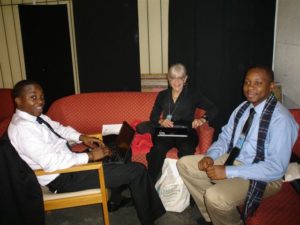 AFP Director Maria Valenti and IPPNW doctors Cathey Falvo from the US and Drs. Hakeem Ayinde and Emeka Okolo from Nigeria joined NGOs from around the world to participate in the UN PoA PrepCom which set the stage for the Review Conference. Dr. Okolo also served as an NGO representative on the Nigerian delegation.
AFP Director Maria Valenti and IPPNW doctors Cathey Falvo from the US and Drs. Hakeem Ayinde and Emeka Okolo from Nigeria joined NGOs from around the world to participate in the UN PoA PrepCom which set the stage for the Review Conference. Dr. Okolo also served as an NGO representative on the Nigerian delegation.
IPPNW’s enduring mission at the UN PoA events is to raise dialogue on the health and human consequences of armed violence, and call for more involvement of the health community in developing prevention programs and policies. Ayinde was one of four speakers during the designated NGO address to states. Read his speech. Maria Valenti and Dr. Falvo wrote the article Public Health Approaches to the UNPoA published in the Small Arms. We reviewed the past ten years of progress on health issues relating to the PoA. -
Fourth Preparatory Meeting of the Arms Trade Treaty New York, USA February 13-17, 2012
Team Aiming for Prevention brought our “prescription” for a humanitarian-based ATT to the February, 2012 4th PrepCom for an ATT where we joined nearly 100 colleagues from the Control Arms Coalition to meet with delegates, plan and conduct side events, and develop strategies to encourage states to pass a strong ATT. IPPNW Drs. Bob Mtonga, Cathey Falvo, Donald Mellman, Shannon Gearhart, Hakeem Ayinde, Emeka Okolo, Omolade Oladejo, Ogebe Onazi and Victor Sidel, and AFP Director Maria Valenti, all participated. IPPNW helped plan/participated in 3 key panels:
- Nobel Laureates for a Strong ATT – Bob Mtonga represented IPPNW on this distinguished panel and asked the audience of more than 300 to “Listen to your doctor – we need a strong ATT”.
- The Role of Public Health and Civil Society in Monitoring the ATT– IPPNW organized this side panel that was sponsored by the Mission of Zambia and was moderated by Dr. Cathey Falvo of IPPNW, PSR. IPPNW speakers included Drs. Vic Sidel (US), Bob Mtonga (Zambia), Omolade Oladejo (Nigeria) and Donald Mellman (US) In sum, the members of the panel convincingly made the point that the ATT must be considered much more than simply another international trade treaty but must be seen as a bulwark in the prevention of death and injury and in the protection of human rights.
- NGO Official Presentation to States – Dr. Omolade Oladejo was one of three speakers at the NGO official presentation to state’s delegates, where she made an impassioned appeal to pass a humanitarian-based treaty.
-
Third Preparatory Meeting of the Arms Trade Treaty New York, USA – July 11-15, 2011 ATT 3rd Prepcom 2011 Conference Report
Ten IPPNW activists brought an important health perspective to the recent Arms Trade Treaty (ATT) 3rd PrepCom meetings at the United Nations headquarters in New York City. The ATT is being sought to control conventional arms transfers that may be used in crime, terrorism, human rights abuses, genocide, violations of international humanitarian law, etc. thus undermining peace, security and sustainable development worldwide.
-
Second Preparatory Meeting of the Arms Trade Treaty New York, USA February 28-March 4, 2011 ATT 2nd Prepcom 2011 Conference Report
Thirteen IPPNW physicians and members from six countries brought a critical health perspective to the UN and spoke on two panels, and contributed a unique medical perspective on armed violence as a health and humanitarian crisis and a threat to development, as well as the role of the medical community in solving this global challenge.
-
4th Biennial Meeting of States to Consider the Implementation of the Programme of Action on Small Arms and Light Weapons – July 14-18, 2010 PoA BMS 2010 Conference Report
Maria Valenti and PSR Philadelphia Executive Director Patricia Harner joined IPPNW physicians Sina Helbig (Germany), Robert Mtonga (Zambia), Emperatriz Crespin (El Salvador), Ime John (Nigeria), and Cathey Falvo, Vic Sidel (US) in bringing an important health perspective to the Fourth Biennial Meeting of States.
-
3rd Biennial Meeting of States to Consider the Implementation of the Programme of Action on Small Arms and Light Weapons – July 14-18 2008 PoA BMS 2008 Conference Report
IPPNW presents on human dimensions of small arms violence, conducts public health panel on “Risk and Resilience.”
-
Review Conference (RevCon) to Consider the Implementation of the Programme of Action on Small Arms and Light Weapons – June / July 2006 PoA RevCon 2006 Conference Report
IPPNW raised a public health voice to highlight the human face of suffering at the United Nations Review Conference.
-
PrepCom to the Review Conference to Consider the Implementation of the Programme of Action on Small Arms and Light Weapons – January 9-20, 2006 PoA PrepCom 2006 Conference Report
The IANSA Public Health Network and IPPNW activists raised the issue that “guns are bad for health” at the United Nations.
-
2nd Biennial Meeting of States to Consider the Implementation of the Programme of Action on Small Arms and Light Weapons – July 11-15, 2005
IPPNW Central Office staff and affiliate leaders from Africa, South Asia, and Latin America gathered at the United Nations in New York City at the Second Biennial Meeting of States on the Programme of Action (UNPoA) on Small Arms to participate in a variety of sessions.
-
1st Biennial Meeting of States to Consider the Implementation of the Programme of Action on Small Arms and Light Weapons – July 7-11, 2003 1st PoA BMS 2003
This was a series of follow up meetings to determine the progress nations have made toward achieving the goals set out in the Programme.
-
Programme of Action to Prevent, Combat and Eradicate the Illicit Trade in Small Arms and Light Weapons in All Its Aspects -2nd Prepcom January 2001 PoA Prepcom 2001 Conference Report
